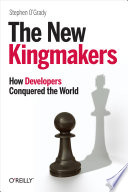

In 'The New Kingmakers', the authors argue that software has become one of the most powerful forces in modern business. This shift signifies a move away from traditional manufacturing and service-based economies towards a software-driven landscape. Companies that leverage software effectively can disrupt entire industries, create new business models, and redefine customer experiences. The book emphasizes that software development is no longer just the responsibility of IT departments; it has become a core competency that permeates all levels of an organization. This democratization of software development means that non-technical roles must understand software's implications and potential. The authors highlight examples of companies that have successfully integrated software into their business strategies, showcasing how those that embrace this change can gain a competitive edge.
Continue readingThe book highlights the significance of fostering a strong developer culture within organizations. It posits that the best software is created in environments where developers feel empowered, supported, and valued. Organizations that prioritize developer culture tend to attract and retain top talent, leading to higher productivity and innovation. The authors discuss various practices that contribute to a healthy developer culture, such as continuous learning, collaboration, and open communication. They also address the challenges of maintaining this culture in larger organizations, where bureaucracy can stifle creativity. By sharing insights into how leading tech companies cultivate their developer cultures, the book serves as a guide for organizations aiming to improve their software development practices.
Continue readingA central theme in 'The New Kingmakers' is the transition from traditional IT practices to DevOps methodologies. The authors explain how DevOps represents a cultural and technical shift that promotes collaboration between development and operations teams. This integration allows for faster delivery of software, improved quality, and more efficient use of resources. The book outlines the principles of DevOps, including automation, continuous integration, and continuous delivery, and discusses the benefits of adopting these practices. Furthermore, it addresses the common pitfalls organizations face when implementing DevOps and provides strategies for overcoming these challenges. By embracing DevOps, organizations can enhance their agility and responsiveness to market demands.
Continue readingThe authors delve into the impact of open-source software on the technology landscape. They argue that open source has democratized software development, allowing anyone to contribute to and benefit from software projects. This collaborative approach has led to rapid innovation and the emergence of robust software solutions that might not have been possible in a closed-source environment. The book highlights successful open-source projects and the communities that support them, illustrating how organizations can leverage open-source tools to enhance their own development processes. Additionally, the authors discuss the challenges associated with open source, such as security concerns and the need for proper governance, providing a balanced view of its advantages and drawbacks.
Continue readingIn a rapidly evolving technological landscape, the authors stress the importance of continuous learning and adaptation for both individuals and organizations. They argue that the pace of change in software development necessitates a commitment to lifelong learning, as new tools, methodologies, and best practices emerge regularly. The book encourages readers to cultivate a growth mindset, embrace experimentation, and seek opportunities for professional development. The authors also highlight the role of mentorship and knowledge sharing within organizations, emphasizing that fostering a culture of learning can lead to greater innovation and resilience in the face of change.
Continue readingThe New Kingmakers emphasizes that technology is no longer a support function but a critical driver of business strategy. The authors argue that technology leaders must be involved in strategic decision-making, as technology can create new revenue streams, enhance customer experiences, and improve operational efficiency. The book provides examples of organizations that have successfully aligned their technology initiatives with their business objectives, demonstrating the value of integrating technology into the core of business strategy. It also discusses the challenges that arise when technology and business leaders do not collaborate effectively, underscoring the need for a unified approach to strategy development.
Continue readingFinally, the authors explore the implications of a software-driven world for the future of work. They discuss how automation and artificial intelligence are transforming job roles and the skills required in the workforce. The book calls for a reevaluation of education and training programs to ensure that individuals are equipped with the skills needed to thrive in this new landscape. The authors also emphasize the importance of diversity and inclusion in technology, arguing that diverse teams are better positioned to drive innovation and address complex challenges. By addressing these issues, the book provides a forward-looking perspective on how organizations and individuals can prepare for the future of work.
Continue readingThe reading time for The New Kingmakers depends on the reader's pace. However, this concise book summary covers the 7 key ideas from The New Kingmakers, allowing you to quickly understand the main concepts, insights, and practical applications in around 25 min.
The New Kingmakers is definitely worth reading. The book covers essential topics including The Rise of Software as a Dominant Force, The Importance of Developer Culture, The Shift from IT to DevOps, providing practical insights and actionable advice. Whether you read the full book or our concise summary, The New Kingmakers delivers valuable knowledge that can help you improve your understanding and apply these concepts in your personal or professional life.
The New Kingmakers was written by Stephen O'Grady.
If you enjoyed The New Kingmakers by Stephen O'Grady and want to explore similar topics or deepen your understanding, we highly recommend these related book summaries:
These books cover related themes, complementary concepts, and will help you build upon the knowledge gained from The New Kingmakers. Each of these summaries provides concise insights that can further enhance your understanding and practical application of the ideas presented in The New Kingmakers.